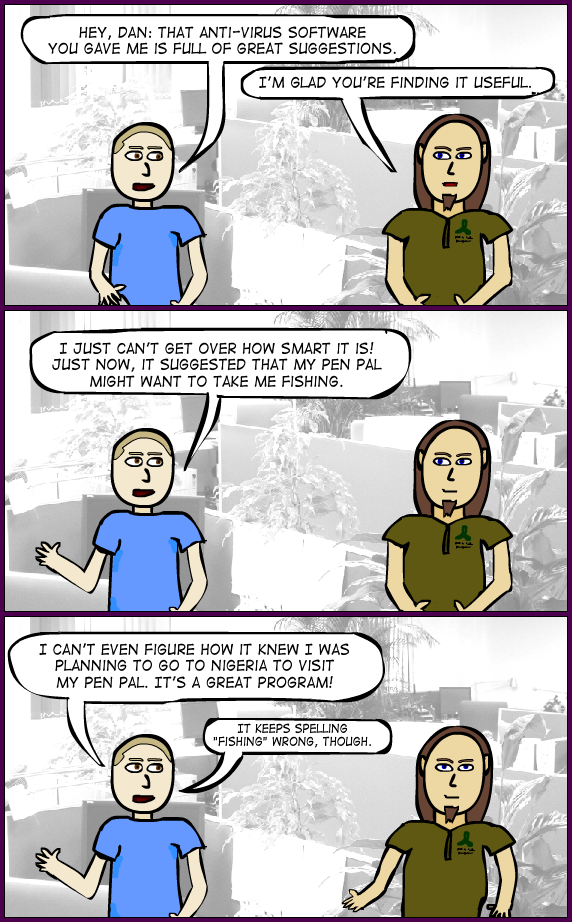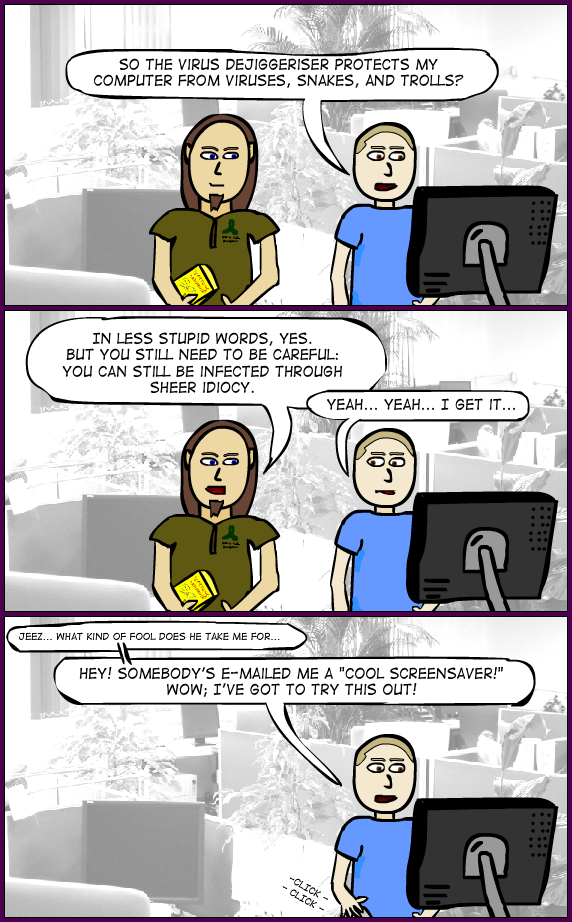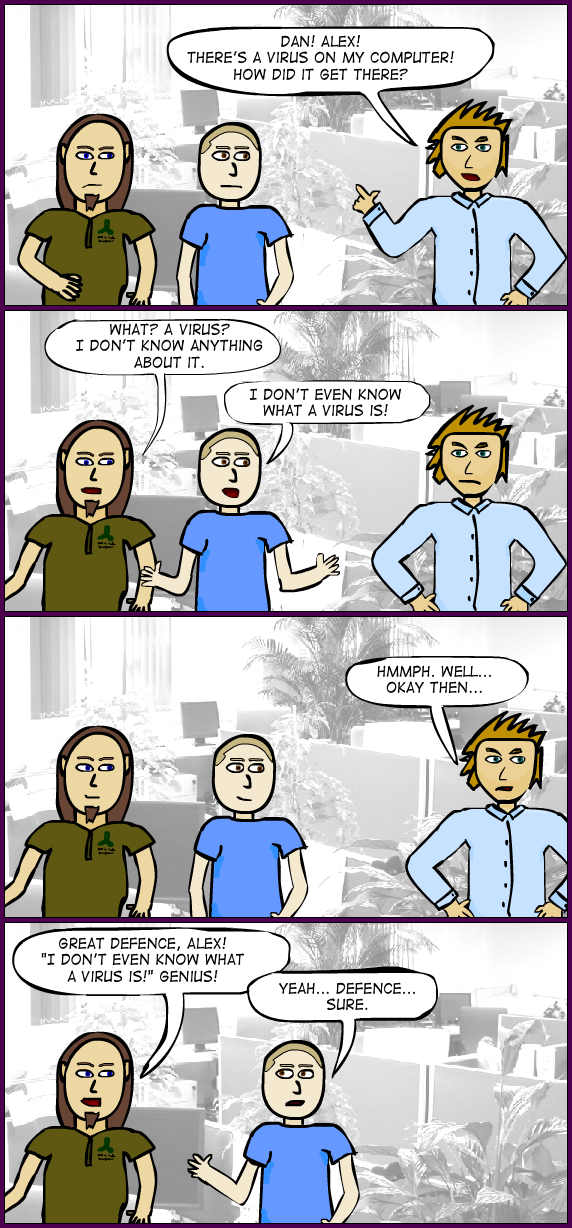I just thought I’d take the time to share with you all some things I’ve learned about active listening over the last few
years: techniques to benefit more fluid communication with less scope for conflicts – and with the capability to help de-fuse arguments before they get out of control. I know that I’ve
spoken with a lot of the people who read my weblog before about active listening and what it’s all about, but I’d still recommend reading this article, when you get the time. Why?
- Firstly, while I know all of these principles and ideas, I’m not necessarily very good at executing them. You’ll get a far better overview of how to be a good listener (and
communicator in general) by reading this than by debating it with me!
- I’ve been thinking about what active listening is actually all about particularly much for the last few weeks, and I’ve got some new points. Go read.
What Is Active Listening
Active listening is a set of techniques for better listening to what another person is saying, and better expressing yourself to them in a way that they are likely to comprehend, using
language that they are familiar with, and in a way that allows them to be comfortable with what is being discussed. It is widely used by therapists, counsellors, and helplines to help
people be open and discuss whatever is bothering them in a way that makes them feel safe and unpressured, but it has wider value: the best team leaders, public speakers, mediators,
diplomats, judges, hypnotists, “friendly ears”, consultants, journalists, attendees of any meeting whatsoever… parents!… in fact – anybody who needs to communicate with anybody else –
exhibit characteristics of active listening as part of what they do. We say things like “you’re easy to talk to” to people who listen attentively and with whom we feel comfortable
talking: and the techniques that people who are easy to talk to use all comes under the broad category of active listening.
Some people are naturally good listeners. You probably know a few of them. But that they are good listeners doesn’t necessarily have any bearing on the other elements of their
personality: some good listeners are quiet and shy, while others are outgoing and confident. Some good listeners speak well on the telephone, while others prefer face-to-face contact.
There are as many different kinds of listeners as there are different kinds of people.
On the other hand, most of us normal people need to study what it is that makes these “good listeners” special and practice it before we can become better at it. And that’s
what this article is here to help you do.
How To Listen Actively
The following techniques are used by active listeners to facilitate better communication:
Rapport
It’s possible to take a huge leap forwards in your ability to communicate effectively by building rapport with the person or people
you’re talking to. Rapport is all about a number of people having a mutual understanding as a medium over which to communicate their ideas: it’s about the subconscious assumptions that
people make about your ability to appreciate their point of view based on the similarity of your physical and behavioural characteristics – tempered, of course, by their opinions.
So what does that all mean? Well; for a start, it means that people who perceive each other as being similar to one another typically communicate more comfortably with one another – no
surprises there: I’m sure you’ll agree that most of the people you find it easiest to talk to are people who are on the same or similar level as you: in terms of factors like age, race,
maturity, intelligence, accent, religion, level-headedness, and the distance they like to stand from you when you talk. Of course, the factors that influence your subconscious opinions
of somebody will differ from mine and from those of everybody else in the universe; these are just sweeping examples of the kinds of things that people cite as reasons that they find
communicating with certain people easier (or more difficult) than others.
And now comes the clever bit: you can improve your rapport with people by consciously making an effort to appear more like them – “getting along with them”. Start with your posture: if
they slouch, slouch. If they stand upright, stand upright. If they lean on one arm, lean on one arm. Don’t be concerned about looking like you’re imitating them: it’s quite easy to make
any movements quite subtle, and, if you watch a pair of good friends talking, you’ll see that they do these kinds of things instinctively. Try to find a distance that they are
comfortable with – some people need more “space” between you, whereas others like to be quite close. If they like to make eye contact, make eye contact back, but if their eyes wander,
look in the directions that they look in (but be sure not to have your eyes wandering too much, or it might look like you’re not paying attention to them). If they touch their face when
they’re listening to you – touch yours when you’re listening to them. Through simple techniques like these you can easily make another person feel far more at ease talking to you than
they otherwise would, and, as a result, facilitate friendly communication. Make sure, however, that your body language matches your tone of voice, or you’ll come across as a fake.
Some advanced rapport-building techniques, including both physical and verbal mirroring, and explored in a paper by
John Clabby and Robert O’Connor [PDF]. Also consider reading about what causes friendship, which looks at
psychological studies into things like the Ben Franklin effect (where you come to like people you help because “why would you have helped them if you didn’t like them?”).
Feedback
An extremely important part of active listening is feedback; providing evidence to the talker that you are understanding what they’re saying (if you are!) and that their concerns are
important to you. Active listeners achieve this in several ways:
Attention
They actually do pay attention to what is being said! The single best way you can appear to be listening is to actually listen. It may help to make notes on what is being said
– particularly in meetings or during telephone calls – or otherwise find a way to record your memories of the event: but if you do this, do not try to deliberately hide your thoughts
from the talker. If, in a meeting, you take notes but prohibit others from seeing them, it feeds suspicion that you are hiding something or that you weren’t being as attentive as you
claimed! In addition, fidgeting and “clock watching” detract enormously from the image of your “all ears” persona: don’t!
Encouragement
Encourage the person talking to continue for as long as they wish to. In face-to-face conversations involving small numbers of people and when using the telephone, this can be achieved
through body language and non-verbal reinforcement alone. Nodding says “I understand”, eye contact says “I’m listening”, leaning closer says “I’m interested”, turning your eyes to the
side and slightly downwards says “I’m interpreting what you’ve said” – we do all these things in our day-to-day lives, but an awareness of them can help us to better understand the
signals they they give off. For example, turning your eyes upward, particularly if they also turn to the side, can indicate that you are letting your imagination drift: this may be fine
depending on the topic of conversation, but if you’re supposed to have your feet on the ground with somebody who’s telling you something quite important, it can be quite distracting.
Similarly, looking directly over somebody’s shoulder while they talk can make them feel quite uncomfortable (try it sometime in an extended conversation with somebody who won’t mind and
watch them squirm).
Interest
Express an interest in what is being said by inviting the talker to say more: short phrases like “go on,” “I see,” and “tell me more,” correctly placed, can make a talker feel wanted…
and can work wonders for the confidence of a speaker who is less comfortable with what they’re having to say. Ask questions that identify key areas that you’d like them to talk about,
by asking, for example, “could you tell me more about X?” but remember to let them lead the direction of the conversation (that said, if they begin to repeat themselves, you
can use questions like this to influence the conversation to take another direction, to allow them to explore a new area, or just to improve your understanding of an element of what
they’re saying).
Summarising
Periodically, go back over old material in a shortened “summary” form. This aids retention, demonstrates that you were listening, and helps to clarify points. This is also useful for
drawing a line under whatever has been said before, when the conversation’s about to take a new direction. For example, you could say “We’ve talked about X and Y, and
we agreed that option 2 is the way forward: I’ll take a look this evening at the information on X so that we’ll be ready to carry on when we next meet. Now, shall we
talk about the issue of Z?”
Sometimes, you and the other person or people may disagree on a summary that you’ve made: if so, apologise and ask them to explain the way that they understand it. The summary may be
the last chance you have to formalise what you’ve talked about, so it’s important to get it right (particularly if you’re in a meeting scenario and incorrect information may otherwise
be recorded where it could lead to future arguments).
Summarising provides a great opportunity for a break, too: having called an end to the last topic of conversation and agreed on what the results were, you’re able to come at the next
topic (or addendum) with a fresh mind.
Language
Arguably part of your rapport with the other person, language is of such significant importance that it warrants a section of it’s own. The choice of words you use when communicating
with somebody is of comparable relevance as the semantics (what you’re actually getting across). Major factors which affect the language a speaker will use include:
Languages spoken
A conversation where the shared language is not the first language of one of the speakers may necessitate a different choice of words to that which would be used when speaking to
somebody who’s native tongue it would be. Outside of their first language, speakers will often favour shorter, simpler words, and may try to explain detailed concepts rather than try to
determine the correct phrase to use. They are also more likely to use gestures to expand on their points than they are words, and – in the absence of these gestures (for example, on the
telephone) – they may have difficulty making their meaning clear. When dealing with somebody for whom you do not speak their native language, be ready to reuse their words (which they
have demonstrated a familiarity with) and apply them to your points. Speak at a rate comparable with the rate at which they speak, and, if they seem to be having difficulty, offer to
speak more slowly or to , repeat, or rephrase yourself.
Background
Even where the language is the same, the words used in a conversation are heavily influenced by the background and upbringing of the speakers. Level of education, proficiency in a given
topic, a desire to impress, confidence, and many other factors can influence the way that a speaker will talk. Be aware of the difference between the words and phrases you use and those
used by them, and work to bridge the gaps by speaking in a manner that will be understood by them as well as by you.
This has to be done carefully, though – don’t be seen to “speak down” to somebody – watch for the warning signs: irritability and impatience with the speed at which you are progressing.
Conversely, don’t try to bluff your way through a topic you don’t understand – if you don’t know what the speaker is talking about, ask!
“Temperature”
A major factor that influences the languages used in a conversation is known as temperature. Temperature is an unquantifiable measurement of the tension of the parties engaged
in a conversation. If temperature becomes too high, it can lead to an argument, an abrupt end to the conversation, hostility, uncooperative behaviour, and violence. But sometimes –
rarely – too low a temperature can prove problematic, too – causing stagnation in the conversation and damaging the impetus of the speaker to drive on into a controversial or personal
topic.
Things that raise the temperature of a conversation include:
- Bad rapport
- Anxiety and stress
- Personal questions or embarrassing subjects
- Feeling that what you say will incite negative opinions or reactions from the listener(s)
- Difficulty in understanding the conversation
- Excessive repetition
- Pressure to answer questions
- Judgemental questions (e.g. “Was it you that stole the cake?”)
- Perceived threats
- Condescending behaviour
- Alcohol, caffeine, and many other drugs
- Lying, by either party
- Conflict of opinion or intention
Suggestions for lowering temperature:
- Improve rapport! Get “on the level” with the other person.
- Make longer pauses between saying things, particularly asking questions, allowing the other person time to compose themselves.
- Take a break for a few minutes.
- Change the topic (either temporarily or permanently – however, be aware that returning to the topic might result in an even higher temperature if not approached delicately).
Sometimes, this can be the only solution to a runaway temperature situation.
- Remain calm. Calm behaviour encourages calm behaviour: however, read incorrectly, calm behaviour can seem threatening.
- Respect the other person’s position and their right to have their views and their feelings.
- Ask only one question at a time.
- If your actions have contributed to the raised temperature, it’s okay to acknowledge this and apologise for it – but don’t expect the other person to.
- If the other person agrees, consider inviting in a third party as a mediator.
- Backtrack – re-affirm what you are jointly trying to achieve, and go over the summaries made so far: if necessary, try to approach the “hot” topic from a different angle, or try to
agree first on the cause of the temperature increase – it’s possible that there has been a misunderstanding.
- Answer unanswered questions which are causing temperature increases – however, ensure that you have all the information you need to rationally answer any question: in a
high-temperature environment, it can be difficult to consider the options fully. If you need it, ask for more time to consider the question.
- Try to reach a compromise – don’t put your individual goals higher than solving the temperature problem.
High temperatures are dangerously counterproductive. Almost always it’s beneficial first to tackle the temperature, and then the goal at hand, as decisions made in a high temperature
environment are more likely than not going to satisfy all of the parties involved.
At times, people will try to deliberately raise the temperature: this is done, for example, by “hard sell” salespeople, trying to trick you into making a quick decision, interviewers
trying to test your capability to work under stress, or anybody for whom it would be more personally beneficial to catch you out and put you under pressure to answer their questions
without having had a chance to properly consider them. Treat these the same as any other high-temperature situation: remain calm and take your time in handling them, and be aware of
ways of improving rapport and reducing the temperature. Remember: outside of a genuine emergency (when snap decisions are extremely important), there is rarely ever a need for
temperature to be increased – and there should never be a need to cause temperature to spiral out-of-control.
Asking Questions
There’s been a lot written about how to ask questions as part of active listening technique, because it’s a big topic with a lot of scope for debate. Let’s begin by looking at some
different types of questions that you’ll come across. The linguists among you will immediately notice that not all of the example questions are, strictly speaking, questions: however,
they are sentences which invite comment (in the way that “tell me about…” sentences do, despite not being questions), and in the context of active listening, these can be just
as good and sometimes better.
-
Closed questions are questions which can easily be answered with a simple, single word (or short) answer – typically a yes or a no. Some examples would be, “Did you
go to the shops today?”, “Are you enjoying this article?” and “What is the capital of France?” Closed questions are short and functional and great for getting answers, but they’re
almost useless for active listening. For a start, they don’t provide any encouragement for the person answering the question to speak: if a one-word answer will suffice, then a
less-than talkative person will give (at most) a one-word answer. Secondly, they can easily be read (or misread) as being accusational, even when they’re not: suppose I had asked you
this morning to go to the shops for me, and then this evening I asked “Did you go to the shops today?” – this innocent-looking suddenly becomes more than a question; it becomes an
accusation. With closed questions, care must also be taken when using negative terms (e.g. didn’t, won’t, etc.) – “Didn’t you go to the shops today?” is, taken literally, the same
question as before, but the negative tone implies that the person it’s directed at should have gone to the shops: more accusation. People who’s dialects give them a tendency
to use negatives as a start to questions in this manner should be particularly careful when using active listening skills to speak to people who don’t, as they can easily come across
as overly hostile. Avoid closed questions where possible.
-
Open questions are a better option for most active listening exercises. An open question is one which can not be answered with a simple one-word answer, and for which
a pause after a short answer would justify further comment on the part of the person answering. Examples of open questions include, “What happened at the shops?”, “How are you finding
this article?” and “Tell me what you know about France.” Open questions are wonderful tools to help people feel that they can talk to you, and are an excellent way of getting
information from people. An open question can take time to answer fully, so make sure that the person you’re talking to has all the time they need, and give them a few seconds after
they speak to decide if they want to continue before you say something else.
-
“Why” questions deserve a category of their own. A question frequently asked while resolving conflicts is a “why” question – “Why did you go to the shops?”, “What
made you decide to read this article?” (a “why” question in disguise), and “Why are you interested in France?” “Why” questions almost always appear on the surface to be open
questions, but take care – they can easily appear as accusing (and as assuming) as a closed question, if not carefully worded.
When asking questions of somebody, try to give them a fair amount of time to respond. The amount of time given should be increased for tougher questions, for higher temperature debates
(“thinking time” reduces temperature), and for stress-inducing topics or personal issues. The period of time you should wait for a response to begin to an open question should be such
that it almost becomes uncomfortable to wait. Of course, active listening is a reactive approach to communication, and it’s more important still that you make the other person
feel comfortable: try to (non-verbally) reach a compromise whereby they are given all the time they need in which to compose an answer, but are not given so long that they feel
uncomfortable with giving it. Watch for signs of “holding back” an answer to a question: signs like taking a breath but then not saying anything, “catching words”, eyes wandering
upwards, fidgeting, and repeating particular phrases that they’ve demonstrated they feel “safe” saying, rather than exploring new territory – these can, in many speakers, be signs that
they have more to say but that they are consciously resisting saying them. Perhaps you need to give them more time, or talk about something else for awhile, or just find a better way of
approaching the subject. Perhaps they don’t intend to answer your question fully at all. Or perhaps you mis-read them. In any case: patience, open questions, and a tolerant attitude to
their responses is the way forwards.
Beware of asking several questions at once (for example, “Where did you go for your holidays? Somewhere nice?”): people, particularly when they are anxious or in a high-temperature
environment, can react badly to chained questions like these – usually by becoming confused… which question was I supposed to answer again?
Empathy
Another element of active listening is empathy (in fact, some people call it “empathetic listening”). In the context of listening, empathy is about being able to recognise, understand,
and accept and the thoughts and particularly the feelings exhibited by another person. It is not to be confused with sympathy, which is a feeling of compassion for somebody else and
wanting to see them better or happier than they are (sometimes described as “feeling sorry” for somebody). The difference can be hard to see at first, and the reasons for it even
harder. The principle behind empathy in active listening is that you must be able to recognise the views of the other person for what they are so that you can appreciate their position
and understand them, and you must do this before you can accept what they want and what they feel as being entirely valid for their current state. Sympathy, while productive and not
without it’s place, is not welcome within active listening as it encourages a condescending attitude towards the speaker and does not help the listener “get into their shoes”.
How To Be Empathetic
Being empathetic does not mean that you have to agree with everything the speaker stands for (although it is likely to make it easier to empathise with them if you do) and it does not
mean that they “win” any argument: what it means is that you don’t dismiss anything that the speaker says, or give anything any less value than the speaker gives it. Some examples of
failure to empathise would be:
- To somebody who’s just split up with their partner, “There’s plenty more fish in the sea.” To say this is to belittle the feelings that they have about the breakup of their
relationship as something that will go away with time. Whether or not this is true is not your place to judge, active listening teaches.
- Saying “don’t worry about that,” to anything that a speaker is worried about is an example of a failure to empathise, because it implies that the thing they’re worrying about is
worth less than they’re making of it. Empathy is about trying to appreciate the importance of the worrying thing to the speaker, and accepting that worry as valid (even if you think
it’s not).
- Changing the topic to one you feel is more important than the one the person or people you’re speaking to is trying to talk about. This demonstrates a lack of concern for their
feelings, putting yours on a higher pedestal.
How You’ll Know You’re Doing It Right
You’ll know you’re doing it right, first and foremost, because:
- You’ll be communicating with the person you’re speaking to “on the level”, regardless of your or their position of authority.
- You won’t impose your ideas or your solutions, unless you’re asked for them – and even then, you’ll ask what the speaker thinks they should do, first.
- You’ll try to hear the whole story before passing comment on it.
- You won’t express shock, horror, alarm, or disgust at anything you’re told, because – as much as it may disturb you, they’re not your experiences and they’re not your feelings and
so you have no right to judge them.
- You’ll be asking questions to try to help you understand the other person’s position, not so as to glean some part of the information that they’re giving you in order to help
yourself.
- You’ll be tired after the conversation because listening empathetically is surprisingly difficult.
And secondly, you’ll know you’re doing it right because people will feel comfortable talking to you and will say things to you where they wouldn’t normally feel comfortable doing so.
Thirdly, and this is where you’ll really notice that you’ve made an impact: the people you have communicated with in an empathetic way will go on and treat others in a more open,
accepting manner (without necessarily even consciously knowing why they are doing so), as a result of the way that you have treated them.
Things To Be Wary Of
Here’s a few general things to watch out for when you’re listening to people:
- Assume nothing – don’t assume that you understand the other person or can appreciate what they’re feeling, or that you are in any position to help them (you might be, but that’s up
to them to decide, not you).
- Ask first, advise later – before you dispense advice, ask the person what they think they should do, and talk though their options. If they solve the problem themselves, they’ll not
only get what is definitely the right answer for them, they’ll also boost their self-confidence.
- Make every effort not to misinterpret, or be misinterpreted – summarise the conversation so far, and the whole conversation at the end, regularly, especially if the temperature is
high (if the temperature gets high enough, people will frequently make deliberate subconscious misinterpretations of each other’s opinion, as part of the brain’s self-defence
mechanism). Also, be aware that when two parties are feeling hostile to one another, there is a tendency for them to automatically assume that the other is planning something
underhanded, even if they’re not.
- Beware of cultural and language barriers – discussing important points where cultural traditions (or translation difficulties) get in the way can lead to misinterpretation, raised
temperature, and difficulties in understanding.
- Ensure that communication is possible – over longer communications – for example, a series of meetings or an extended number of phone calls – ensure that there is always a way to
establish communication by either party with the other, and that both feel comfortable doing so. This will help to ensure that there is a way to resolve any conflicts that occur outside
of meeting hours.
- Actually listen – breaks in the conversation are for the person who was asked the question to think of their answer, not for the person who asked it to start thinking of
their possible next lines. If you have difficulty with this, try to distract yourself with watching the way that the other person is behaving and trying to understand how they are
thinking.
- Don’t lie – unless it is impossible to evade the question; don’t evade the question if it is possible to answer it. And if you must evade the question, try to explain why you are
doing so. Honesty, particularly in business communications, builds trust and aids future empathy.
- Don’t raise the temperature – keep your cool, and show the other person how to keep theirs. There are some great resources in books and on the internet on the subject of calming
people down: if you frequently find yourself communicating in high-temperature situations, they’re well worth a read. I particularly like the ones involving establishing rapport and
then leading by example (by, for example, encouraging the other person to become more calm by initially acting like them and then slowly becoming more calm yourself).
- Crisis control – if you’re looking into using active listening as part of crisis control, read this guide to
crisis communication: it talks about ways to communicate effectively in a crisis, and maintain calm, collected listening skills even when time is short. There’s also a wonderful
article on rumour control.
Further Reading
Closing Words
Well; that’s pretty much the sum of my knowledge about active listening, all nicely bundled together in one place for the world to read and benefit from. I first started writing this
document after an argument where I realised I’d done an awful job of all of these things (and, in my opinion, so had the other person involved) and I wanted to write myself a reminder…
and share with the world some ideas I’d wanted to for awhile. Hopefully you’ll read this, go off, and communicate better with your friends and workmates, be a better listener, and make
yourself and other people happier as a result.
Active listening can’t be learned from a web page. You have to go and try it out. Go talk to somebody, and actually listen to what they say – and encourage them to say more.
Find out what their opinions and feelings are, and try to appreciate them from their perspective, even if you don’t agree with them. Good luck.
Feedback appreciated. If you can’t get the comments form to work, send e-mail to active spam listening at scatmania spam dot org (remove the word ‘spam’ and the spaces and put @ sign
and . where indicated).



 Download the Windows installer
Download the Windows installer
